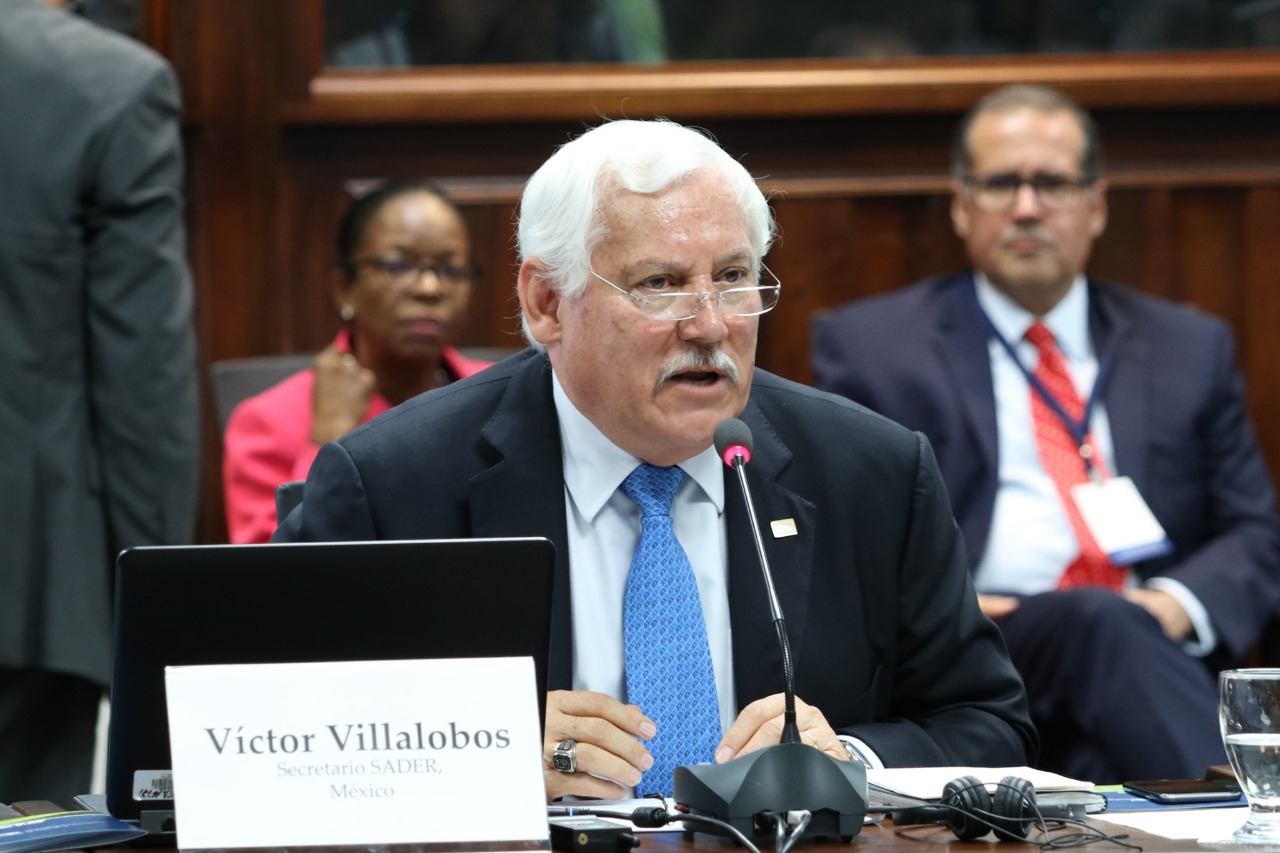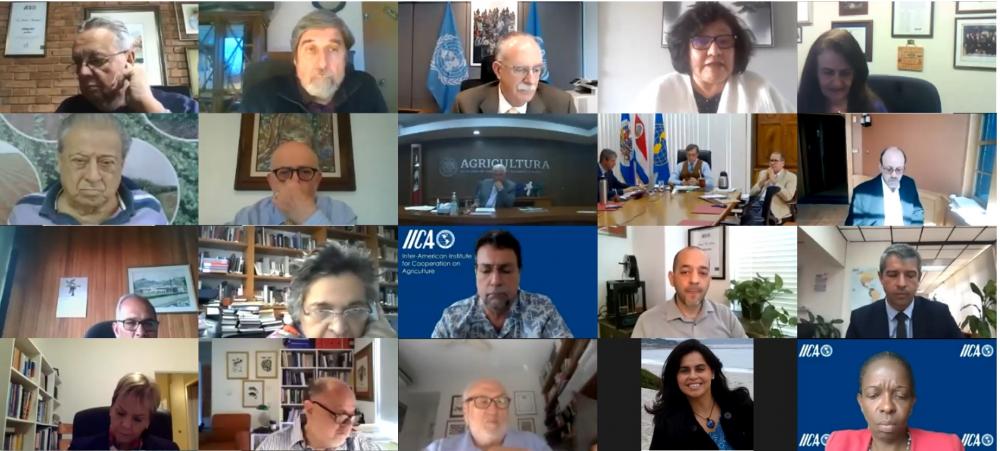Víctor Villalobos, Mexico’s Secretary of Agriculture and Rural Development, addressed members of IICA’s Advisory Council for Food Security in the Americas and specially invited guests, among them, winner of the Nobel Prize for Economics, Michael Kremer.

San Jose, 16 March 2021 (IICA) – Speaking to a gathering of experts on agricultural issues, convened by the Inter-American Institute for Cooperation on Agriculture (IICA), including Michael Kremer, winner of the 2019 Nobel Prize for Economics, Víctor Villalobos, Mexico’s Secretary of Agriculture and Rural Development gave a broad overview of the production and social scenario in his country – the world’s fourteenth largest producer and eight largest exporter of food.
In his more than two-hour keynote address, organized by IICA’s Advisory Council for Food Security in the Americas, Villalobos—a respected agronomist with a Doctorate from the University of Calgary, who throughout his career has helped promote the preparation of young professionals in agricultural sciences—indicated that “productivity, sustainability and inclusion” are the pillars underpinning Mexico’s public policies for agriculture. He also raised concerns about the water footprint in food production.
Villalobos felt that Mexico’s voice should be heard at the UN Food Systems Summit, slated for the end of September, stating that, “We want to share this with our fellow Latin American and Caribbean countries and with IICA”. He also endorsed the “initiative spearheaded by Manuel Otero (Director General of IICA) to make the next meeting of the IABA (Inter-American Board of Agriculture) a sounding box to ensure that the views of the hemisphere’s agriculture sector are conveyed at the Summit, allowing it a level of participation in keeping with its strategic role in Food Systems”.
The meeting of the IABA, IICA’s highest governing body, will occur on 1 and 2 September, bringing together the Ministers and Secretaries of Agriculture of the Americas and thus serving as a major forum for coordination and alignment in preparation for the global summit.
Villalobos, who was IICA’s Director General from 2010 to 2018, admitted that, “We are concerned that although it is the basis for food systems, agriculture has not been given a leading role in the summit. Without food, we cannot attain or achieve anything else, even as we recognize the importance of addressing environmental, health and nutrition-related issues. We cannot accept that they become the sole issues of the global agrifood trade or that they be used as an excuse to further punish the small farmer”.
“Nor can we neglect to guarantee access to food for those millions who are the poorest among us, while seeking to address the needs of consumers with extensive purchasing power”, he warned.
“Similarly, Mexico’s Secretary of Agriculture and Rural Development remarked that, “Agrifood systems still face an uncertain future, but we know we must adopt measures to bring an end to the continued marginalization of the millions of producers and small farmers who remain poor”.
Villalobos explained that in Mexico, “We remain committed to the idea that the future of agriculture should be based on scientific knowledge, provided that it assists in reducing and not widening existing productivity gaps among different types of producers, regions and even countries. This will be Mexico’s stance at the Summit”.

In addition to Nobel Prize winner, Kremer, also present at the meeting were Miguel García-Winder, Mexico’s Ambassador to the FAO and himself a former IICA staff member; Beatriz Paredes, Mexican Senator and IICA Goodwill Ambassador; Muhammad Ibrahim, the Director General of CATIE (Tropical Agricultural Research and Higher Education Center); and Julio Berdegué, FAO Assistant Director General and Regional Representative for Latin America and the Caribbean, among others.
SNAPSHOT OF AN AGRIFOOD POWER PLAYER
The IICA Advisory Council for Food Security in the Americas—comprised of experts from 10 countries—seeks to monitor the new Coranavirus’ impact on food security and then provide an analysis and recommendations to inform decision-making in different public and private sector entities. Villalobos presented the body with a comprehensive overview of the situation in Mexico’s rural areas.
He emphasized that, “Agriculture and the agrifood sector in Mexico are tackling more or less the same challenges as other countries: to produce more efficiently; to increase the integration of national production chains and connect them to global chains; as well as to improve competitiveness and produce food more sustainably, thereby guaranteeing the food security of the entire population”.
Villalobos remarked that public policies to strengthen the Mexican countryside, implemented by the Administration of President Andrés Manuel López Obrador, “are in keeping with the national project that we are promoting”, thus representing “an integral part of the transformation on which we embarked” when this administration came into power.
“We want a country with greater economic equilibrium and much more social equity. We understand the tremendous importance of the agrifood sector to the national economy and the well-being of millions of people and are acting in accordance, recognizing that the various actors are operating under different conditions, which calls for the application of differentiated policies”, he said.
According to the Secretary, Mexico currently has approximately 24.6 million hectares of land devoted to agricultural production. A further 5 million hectares of abandoned land are not in use, but have great potential to be incorporated into agricultural activities. Around 109,000 hectares are dedicated to livestock production and 11,000 km of coastal waters to the fisheries industry, in addition to other inland bodies of water that are part of the developing aquaculture industry”.
In total, Mexico—one of the countries listed as a center of origin and important center of domestication of agricultural and animal species and microorganisms—has some 5.4 million farmers, 880,000 livestock breeders and 145,000 fisherfolk and aquaculture farmers.
Villalobos commented that, “We are extremely proud to be the center of origin and domestication of corn, which has made a significant contribution to the rest of humanity. However, our ancestors also domesticated other species in our country, such as chili peppers, cocoa, vanilla, amaranth, tomato, pumpkin, bean, and avocado, all of which play a major role in the world today”.
Despite the pandemic triggered by the spread of the new Coronavirus last year, the country produced 290.2 million tons of food – achieving “a production record, thanks to the producers”.
Agrifood exports in 2020 amounted to 39.525 billion dollars, with destination markets in more than one hundred countries.
“We feel very proud to be the fourteenth largest producer and eight largest exporter of food in the world”, said Villalobos. “Those 290.1 million tons of food are special to us. Our agriculture is diversified. Production is partially agricultural, with some diversification in the cultivation of vegetables and different species. The same is true of the livestock, fisheries and aquaculture industries. Last year agrifood exports grew 5.2% and imports fell 5.47%”.
Mexico also recorded a positive trade balance of 12.347 billion dollars, which represented a 40% increase over 2019, with products such as beer, avocado, tomato, animals, tequila and red fruits leading external sales and accounting for 64% of the country’s agricultural and agroindustrial exports.
Blueberries, blackberries, strawberries, raspberries, mulberries, nuts, bell peppers and green chili peppers were other outstanding performers, as were eggs, poultry, beef, fish, shrimp and octopus.
PRODUCTIVITY, SUSTAINABILITY AND INCLUSION
Nonetheless, Villalobos stressed that despite the strength and enormous potential of the Mexican rural sector, “all of that beauty and that wealth is not reflected in the quality of life of the peasant farmers, small farmers and indigenous people in rural areas”. He insisted that “there is a debt that is long overdue to the poorest in the society – our peasant farmers and indigenous people”.
Some 55.3% of the rural population is poor, 16.4% of which are living in extreme poverty.
“It is clear that we have to settle that debt. The vision and primary objective of the Government headed by President López Obrador is to rid rural areas of poverty, rescue rural areas and convert them into an important engine of growth for the country. We are committed to this idea of creating a more equitable agriculture sector, a sector designed to relieve poverty and to rescue rural areas from that situation, which is something that we have been postponing for several years”.
Villalobos linked the success of this task to the creation of a more equitable society that would assist in mitigating phenomena such as migration, insecurity and violence.
He also gave details about how productivity in Mexico varies according to geographic region, with some regions enjoying a concentration of scientific and technological development, investment, insurance and mechanization, while benefitting from an agricultural revolution that included irritation, growth, infrastructural works, dams and agribusiness development, with full access to knowledge, technology and credit.
On the other hand, 85% of productions units in rural areas from central Mexico down to the country’s south and south eastern region are family farming units, which have no market access and are engaged in near-subsistence farming.
The Secretary reported that, “We were extremely successful in developing agriculture in the country’s north central region and now that we are talking about offering redress for rural society, we must turn to the south, which, although poor, has the potential to develop an agriculture sector to complement the other half of the national territory”.
“We have a new perspective on Mexican agriculture, based primarily on three pillars, three areas of focus. One of them is the need to be much more efficient in production. The second pillar relates to sustainability. We are particularly concerned about soil and water management. The third pillar is inclusion. Inclusion is an extremely important issue for us, because we recognize that all farmers are important but they have different needs. These three pillars are basic and fundamental to food self-sufficiency, that is, to progressively reduce the tendency to import basic products to feed Mexican society”, he explained.
Finally, he mentioned his concern that the search for an approach to the development of agriculture, “should not be at the expense of the future”.
To this end, he explained that, “We need to produce more tons, but to do so with less water. We are concerned about our water footprint. We are extremely concerned that we are one of the countries most affected by climate imponderables, specifically the fact that a large share of agriculture in the north of the country—the north central region—depends heavily on rainfall, which is becoming increasingly erratic. We are experiencing extreme temperatures, frost, at times when in the past we would not have expected it”.
As such, he explained, the water footprint is an indication of how much we have been investing in water to produce food.
In closing, Villalobos pointed out that, “The data shows that 2,400 liters of water are used to produce one hamburger and seventy liters to produce one apple. Two eggs require 400 liters of water. What we are thinking is that, clearly, the use of the appropriate technology may not allow us to do without these products, but will allow us to reduce water use without sacrificing quality, nutrition or consumer acceptance. We have to think about how we are going to reverse or reduce the impact of the water footprint without sacrificing production. Technology obviously plays a critical role in this”.
More information:
Institutional Communication Division
comunicacion.institucional@iica.int











